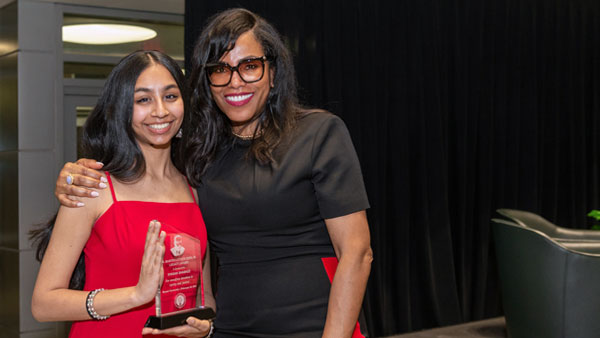The keys to the future lie in our acknowledgement of the past and our commitment to one another, according to Ilyasah Shabazz, author, educator, and daughter of civil rights leader Malcolm X, who delivered the keynote address for Bryant University’s 10th annual Martin Luther King Jr. Legacy Dinner on February 16, 2023.
Marking 60 years since civil rights leader Martin Luther King Jr.’s iconic “I Have a Dream” speech, the MLK Jr. Legacy Dinner was hosted by a range of campus partners and attended by a sold-out crowd. That coalition and solidarity, Shabazz stated, is essential to furthering equality and justice.
“We can choose to either fight each other or fight for each other because when we fight for each other, our possibilities are limitless,” Shabazz noted. “We must work together, walk together, and stand together. We must support one another and push to find our way forward together to address the wounds of corruption and oppression in our communities.”
A call to history
The co-chair of the Malcolm X and Dr. Betty Shabazz Memorial and Educational Center, Shabazz has dedicated herself to institution building and intergenerational leadership development, following the tenets of diversity, equity, and inclusion. As president and founder of Ilyasah Shabazz Enterprises, she produces a variety of forums dedicated to power, possibility, and sovereignty. She has also authored five historical novels and served as a project advisor for the award-winning PBS documentary, Prince Among Slaves.
She opened her talk with a call to remember our history, and noted that the loss, and corruption, of so much of that history is an open wound. “I'd like to give praise to our ancestors, all of them, the refined, industrious men and women who have not been properly honored in history: Those whose stories have been improperly documented. Those to whom we all trace our heritage and our identity. Those from who we learned purpose,” she stated.
By engaging with our collective heritage and ensuring that all people are equally represented in that history, we not only gain a clearer picture of the forces that have shaped us, but also gain the strength of those who have gone before us as well, Shabazz suggested. “America's truth and history must be taught to students and every school, at every level. It is our opportunity to eliminate peer pressure, bullying, and bigotry by instilling the values of honesty, compassion, and forgiveness.”
She pointed to the power of history in her own life, the lessons she learned from her parents and mentors, and how she has worked to correct the misconceptions about her father’s work. One of the most prevalent distortions is the idea that the views of King and Malcolm X were fundamentally opposed to one another, said Shabazz, who noted the strong bonds between their two families. “My father's point of view was human rights and Dr. King's point of view was civil rights. And we need both to accomplish our collective goals of peace, freedom, and human dignity.”

Together, she said, they offered a roadmap to the future. “Dr. King's words still ring true: ‘The arc of the moral universe is long, but it bends toward justice,’” Shabazz told the audience. “But let us not forget Malcolm's addendum: ‘The arc of the moral universe won't bend on its own.’”
Solidarity and action
Shabazz praised events like the MLK Legacy Dinner as opportunities to build solidarity and prepare for action. “The fact that you are here today is evidence that you are committed to becoming agents of change simply by having these conversations at Bryant University — conversations we can no longer take for granted,” said Shabazz. “You are making a difference in the world. And I salute you. When we bear witness, choosing community over chaos, we will be empowered by the truth that each and every one of us is a beautiful creation destined to shine our light for the greater good.”
Her words echoed the thoughts expressed by Bryant University President Ross Gittell, Ph.D., in his opening remarks, as he noted the importance of gathering together to talk, discuss, debate, and seek justice. “The words of Dr. King continue to resonate and offer very important meaning and purpose for individuals seeking greater equity and social justice in the United States and around the world,” said Gittell. “As a campus community, we must continue to learn from his writing and from his commitment to finding collective solutions to society’s most critical challenges.”
At the conclusion of her talk, Shabazz engaged in a moderated discussion and question and answer session led by Alejandro Vaquerano ’23 and Louise Barro ’23 that touched upon a range of topics including the meaning of Black History Month and the power of literature as activism. She was also presented with the Reverend Martin Luther King Jr. Legacy Award, which recognizes individuals who exemplify Dr. King's spirit, life, teachings, and commitment to service and who have made significant and tangible contributions in the areas of race relations, justice, and human rights through their work.